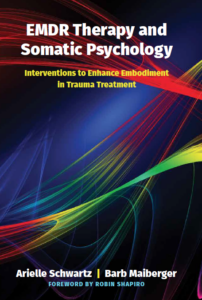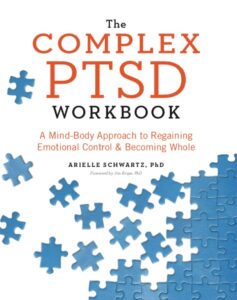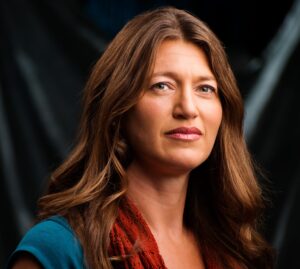 Do you ever notice how one small positive change can shift your perspective? Recently, I had one of those rough days and was feeling irritable and down. I decided to get out for a walk anyway. After ten minutes, I began to notice the subtle colors of the clouds as the sun lowered in the sky. The feeling of the wind on my skin helped to lift my spirits as I reclaimed a sense that “everything was going to be okay.” Before long I had a familiar spring in my step…I had caught what Alex Korb calls The Upward Spiral (New Harbinger, 2015).
Whether you are recovering from trauma or facing lifelong depression, the upward spiral can help you focus on the cumulative effect of the small changes you can make to improve your mood each and every day. Korb offers a recipe for a balanced life with a cup of positive thinking, a heaping tablespoon of good habits, and a sprinkle of mindfulness.
Do you ever notice how one small positive change can shift your perspective? Recently, I had one of those rough days and was feeling irritable and down. I decided to get out for a walk anyway. After ten minutes, I began to notice the subtle colors of the clouds as the sun lowered in the sky. The feeling of the wind on my skin helped to lift my spirits as I reclaimed a sense that “everything was going to be okay.” Before long I had a familiar spring in my step…I had caught what Alex Korb calls The Upward Spiral (New Harbinger, 2015).
Whether you are recovering from trauma or facing lifelong depression, the upward spiral can help you focus on the cumulative effect of the small changes you can make to improve your mood each and every day. Korb offers a recipe for a balanced life with a cup of positive thinking, a heaping tablespoon of good habits, and a sprinkle of mindfulness.
“There are many ways to overcome obstacles and create positive change; you might choose exercise, therapy, relaxation, meditation, art, music, or keeping a gratitude journal. Most importantly, only you know what brings you joy. Once you find a recipe that works in your life, I invite you to commit to a regular practice devoted to bringing balance and resilience to your life. The combined power of your chosen practices can help you catch the upward spiral. Not only do you benefit, but research indicates that resilience is contagious—that we benefit vicariously by witnessing each other overcome challenge.” -Dr. Arielle Schwartz
 There are so many ways to create positive change in your life; you might choose exercise, therapy, relaxation, meditation, art, music, or keeping a gratitude journal. Most importantly, only you know what brings you joy. The following practices are some of my favorite practices to create the upward spiral effect. Explore what works for you:
There are so many ways to create positive change in your life; you might choose exercise, therapy, relaxation, meditation, art, music, or keeping a gratitude journal. Most importantly, only you know what brings you joy. The following practices are some of my favorite practices to create the upward spiral effect. Explore what works for you:
 Research shows that exercise provides you with a natural chemical boost to lift your mood by increasing endorphins, serotonin, and norepinephrine (your natural feel-good chemicals). But moving your body in any form, event subtle movement is also beneficial. Interoception is the practice of attending to the internal sensations of your body. This can include a sense of hunger, sleepiness, alertness, tension, pain, or restlessness. If you ignore your sensations, you are more likely to override your basic needs which can lead you to feel imbalanced, anxious, or out of control. Instead, try anchoring your awareness in your body. Explore a way of moving your body that brings you joy…moving quietly in your living room, walking outside, or devoting to a regular yoga practice.
Research shows that exercise provides you with a natural chemical boost to lift your mood by increasing endorphins, serotonin, and norepinephrine (your natural feel-good chemicals). But moving your body in any form, event subtle movement is also beneficial. Interoception is the practice of attending to the internal sensations of your body. This can include a sense of hunger, sleepiness, alertness, tension, pain, or restlessness. If you ignore your sensations, you are more likely to override your basic needs which can lead you to feel imbalanced, anxious, or out of control. Instead, try anchoring your awareness in your body. Explore a way of moving your body that brings you joy…moving quietly in your living room, walking outside, or devoting to a regular yoga practice.
 The enteric nervous system (also called the belly brain) is an intricate mind-body communications network. Your gut is made up of the “microbiome;” an ecosystem with hundreds of species of good and bacteria within your intestinal tracts. An imbalance of this ecosystem can lead to an inflammatory response in your immune system and a wide range of disruptive symptoms—including anxiety and depression. Keys to creating a healthy microbiome include reducing sugar, identifying any hidden food allergies, and, since stress interferes with digestion, building more relaxation into your daily routine.
The enteric nervous system (also called the belly brain) is an intricate mind-body communications network. Your gut is made up of the “microbiome;” an ecosystem with hundreds of species of good and bacteria within your intestinal tracts. An imbalance of this ecosystem can lead to an inflammatory response in your immune system and a wide range of disruptive symptoms—including anxiety and depression. Keys to creating a healthy microbiome include reducing sugar, identifying any hidden food allergies, and, since stress interferes with digestion, building more relaxation into your daily routine.
 When we cultivate a mindset of presence in the outdoors, we ask ourselves to “be here now” as we notice the details of the world around us. The Japanese offer the practice of Shinrin-yoku, translated as forest bathing. They believe that time in nature improves our physical, emotional, and social well-being. The next time you step outdoors whether in your garden, neighborhood walk, or hiking trail, take the time to savor the sensory details of the light, the sounds, the smells. Allow the beauty around you to strike to inspire awe.
When we cultivate a mindset of presence in the outdoors, we ask ourselves to “be here now” as we notice the details of the world around us. The Japanese offer the practice of Shinrin-yoku, translated as forest bathing. They believe that time in nature improves our physical, emotional, and social well-being. The next time you step outdoors whether in your garden, neighborhood walk, or hiking trail, take the time to savor the sensory details of the light, the sounds, the smells. Allow the beauty around you to strike to inspire awe.
 Keeping a gratitude journal is associated with increased positive mood, increased optimism, feeling connected to others, decreased pain, and better sleep. Commit to keeping a gratitude journal and write down what you are grateful for each day. Most importantly, even if it is difficult to find something to be thankful for, the positive results are associated with simply remembering to look for things to be grateful for (Korb, 2015).
Keeping a gratitude journal is associated with increased positive mood, increased optimism, feeling connected to others, decreased pain, and better sleep. Commit to keeping a gratitude journal and write down what you are grateful for each day. Most importantly, even if it is difficult to find something to be thankful for, the positive results are associated with simply remembering to look for things to be grateful for (Korb, 2015).
 Healthy connections to others, whether this occurs in person, over the phone, or even via texts or social media in our modern world, can initiate regulation of our body and mind. When you feel safely connected, accepted, and understood in relationship you engage your social nervous system, the part of your vagus nerve which has a calming and soothing effect on your body and mind. See if you can allow yourself to both give and receive within the context of a trusting bond with another.
Healthy connections to others, whether this occurs in person, over the phone, or even via texts or social media in our modern world, can initiate regulation of our body and mind. When you feel safely connected, accepted, and understood in relationship you engage your social nervous system, the part of your vagus nerve which has a calming and soothing effect on your body and mind. See if you can allow yourself to both give and receive within the context of a trusting bond with another.
 Engaging in loving kindness mindfulness meditation is associated with increased vagal tone, an increased sense of social connectedness, increased positive emotions, and decreased chronic pain. You can explore the following practice by starting with yourself, expanding loving kindness to someone who is a caring friend, and then offering the practice to neighbors, strangers, or animals. Eventually, you may choose to extend loving kindness to someone who brings up challenge or difficulty for you. Begin by saying to yourself, “May I be happy, May I be well, May I be safe, May I be peaceful and at ease.” Practicing for another, you say, “May you be happy, May you be well, May you be safe, May you be peaceful and at ease.”
Engaging in loving kindness mindfulness meditation is associated with increased vagal tone, an increased sense of social connectedness, increased positive emotions, and decreased chronic pain. You can explore the following practice by starting with yourself, expanding loving kindness to someone who is a caring friend, and then offering the practice to neighbors, strangers, or animals. Eventually, you may choose to extend loving kindness to someone who brings up challenge or difficulty for you. Begin by saying to yourself, “May I be happy, May I be well, May I be safe, May I be peaceful and at ease.” Practicing for another, you say, “May you be happy, May you be well, May you be safe, May you be peaceful and at ease.”
 Resilience is defined as our capacity to adapt well in the face of adversity. In short, this is our psychological and physiological capacity to flexibility respond to difficult events. And, witnessing the recovery and resilience in other people who have survived hardship lifts us up. Perhaps you look to the generations that proceeded you and get inspired by the stories of within your own family. Allow yourself to be inspired by someone who has triumphed over difficulty. What allowed them to persevere? What can you learn and apply to your own life?
Resilience is defined as our capacity to adapt well in the face of adversity. In short, this is our psychological and physiological capacity to flexibility respond to difficult events. And, witnessing the recovery and resilience in other people who have survived hardship lifts us up. Perhaps you look to the generations that proceeded you and get inspired by the stories of within your own family. Allow yourself to be inspired by someone who has triumphed over difficulty. What allowed them to persevere? What can you learn and apply to your own life?
 Through the end of December 2018, you can order the EMDR Therapy and Somatic Psychology book directly from W. W. Norton at a 20% discount with free shipping. The coupon code is EMDRSP18 — Click here to order.
Through the end of December 2018, you can order the EMDR Therapy and Somatic Psychology book directly from W. W. Norton at a 20% discount with free shipping. The coupon code is EMDRSP18 — Click here to order.

 Dr. Arielle Schwartz is a licensed clinical psychologist, wife, and mother in Boulder, CO. She offers trainings for therapists, maintains a private practice, and has passions for the outdoors, yoga, and writing. Dr. Schwartz is the author of The Complex PTSD Workbook: A Mind-Body Approach to Regaining Emotional Control and Becoming Whole (Althea press, 2016) and co-author of EMDR Therapy and Somatic Psychology: Interventions to Enhance Embodiment in Trauma Treatment (Norton, 2018). She is the developer of Resilience-Informed Therapy which applies research on trauma recovery to form a strength-based, trauma treatment model that includes Eye Movement Desensitization and Reprocessing (EMDR), somatic (body-centered) psychology and time-tested relational psychotherapy. Like Dr. Arielle Schwartz on Facebook, follow her on Linkedin and sign up for email updates to stay up to date with all her posts.
Dr. Arielle Schwartz is a licensed clinical psychologist, wife, and mother in Boulder, CO. She offers trainings for therapists, maintains a private practice, and has passions for the outdoors, yoga, and writing. Dr. Schwartz is the author of The Complex PTSD Workbook: A Mind-Body Approach to Regaining Emotional Control and Becoming Whole (Althea press, 2016) and co-author of EMDR Therapy and Somatic Psychology: Interventions to Enhance Embodiment in Trauma Treatment (Norton, 2018). She is the developer of Resilience-Informed Therapy which applies research on trauma recovery to form a strength-based, trauma treatment model that includes Eye Movement Desensitization and Reprocessing (EMDR), somatic (body-centered) psychology and time-tested relational psychotherapy. Like Dr. Arielle Schwartz on Facebook, follow her on Linkedin and sign up for email updates to stay up to date with all her posts.

Arielle Schwartz, PhD, is a psychologist, internationally sought-out teacher, yoga instructor, and leading voice in the healing of PTSD and complex trauma. She is the author of five books, including The Complex PTSD Workbook, EMDR Therapy and Somatic Psychology, and The Post Traumatic Growth Guidebook.
Dr. Schwartz is an accomplished teacher who guides therapists in the application of EMDR, somatic psychology, parts work therapy, and mindfulness-based interventions for the treatment of trauma and complex PTSD. She guides you through a personal journey of healing in her Sounds True audio program, Trauma Recovery.
She has a depth of understanding, passion, kindness, compassion, joy, and a succinct way of speaking about very complex topics. She is the founder of the Center for Resilience Informed Therapy in Boulder, Colorado where she maintains a private practice providing psychotherapy, supervision, and consultation. Dr. Schwartz believes that that the journey of trauma recovery is an awakening of the spiritual heart.